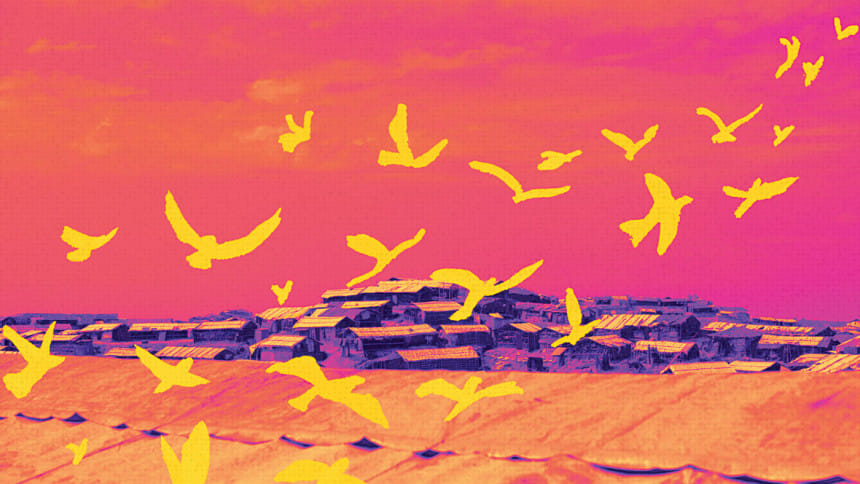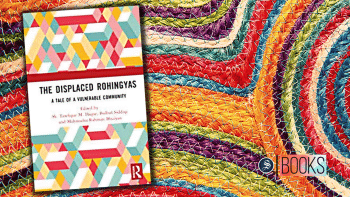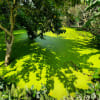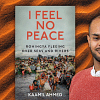Exiles and memories

Markan felt a strange thrill rush through him. For an eight-year-old, even the idea of leaving his village was exciting. He had never left his tiny rural home, except for the rare trip to the market with his father, and he could still recall the smell of salty, dried fish that clung to the air by the beach. But this time, it wasn't just a trip. They were leaving for good, and the coast was the only place they could go.
Markan didn't understand why, but his father's stern warnings echoed in his mind: "Don't cross to the other side, or I'll break your legs." Normally, he might have brushed it off as an empty threat, but lately, he had seen too many children with broken legs—or worse, missing limbs entirely. It wasn't just a threat. It was a promise.
"Get up! Right now," his father shouted, shaking him from his thoughts. Markan scrambled to his feet and saw their meagre belongings packed into two small, worn cloth bundles. He looked at his clothes and the beaten metal plate he always used and wondered where they would go in the chaos of travel. But he was glad to see everything packed. It made this adventure feel real.
"Tell your sisters to stop crying and wait by the road," his father ordered. Markan tugged at his younger sisters' hands, guiding them to the dirt path that cut through the village. They stood there in the early light, staring at the crowd gathering. It wasn't just them. Neighbours—everyone he knew—were heading in the same direction, including legless-Lokman, their neighbour, strapped to a man's back. Markan had heard stories about why Lokman had lost his legs, but his father had always been too angry to explain. Markan only knew one thing for sure: nobody was staying behind.
He had never seen a car, except when the military rolled through and met with the elders. Walking was the only option. And they walked. Through the village, past the fields, and down towards the coast. At first, the beaches were beautiful, the sight of the ocean filling Markan with awe, but two days later, the wonder had worn off. The excitement had turned into exhaustion. His legs ached, and his sisters whimpered with every step.
"Why do we have to walk for so long?" Markan whined, clutching his mother's hand.
"Listen to your father, or I'll beat you too," his mother snapped, her eyes hard. She didn't want to be here either, Markan realised.
The journey became a blur of sand, mud, and fatigue. At some point, the vast crowds of people began to slow down. Hundreds of families huddled together in a narrow space, unsure of where to go. Ahead, Markan saw a barricade. Armed men stood there, rifles slung over their shoulders, their eyes scanning the sea of faces. Markan's stomach twisted with fear. The last time he'd heard gunfire was nearly a year ago, and it had shaken the entire village. He didn't understand why they were being stopped, why soldiers were patting them down. But they were. And as the men's rough hands searched him, his father screamed.
"Stop crying, or I'll give you something to cry about!" Markan's father slapped him across the face, jolting him back to reality. His cheeks burned, but he bit his tongue. The soldiers didn't care about his tears. They just moved on to the next family, rifles slung casually over their shoulders.
After what felt like hours, they were allowed through. More walking. Only now the beaches were gone, replaced by swampy, muddy trails. The sheer number of people trudging through the same muck made it worse. Markan was tired of it all—tired of travelling, tired of walking, tired of crying. He longed for the tree back home where he used to sit, the one spot where everything felt still and calm. Now, he wasn't sure when—or if—he'd ever see it again.
When they finally reached their destination, it wasn't what Markan had imagined. There was no grand welcome, no final resting place. Just a makeshift camp of polythene-covered huts, flapping in the wind. His father didn't yell anymore. He was too tired to shout. His sisters collapsed beside him, and his mother unpacked the silver-wrapped food rations tossed their way.
That night, Markan slept. Really slept. For the first time in days, the noise faded into the background, and the ache in his legs eased. But when he woke the next morning, the weight of the journey lingered, like something had shifted inside him.
Over the years, that weight never left. The camp grew, but the stories of the home they had left behind faded. The men with ironed clothes and polished shoes came, asking if they needed more tokens. Sometimes they brought notebooks for the girls, asking about school. Other times, men with strange accents and big cameras pointed them at Markan's face, asking, "Where are you from? Do you want to go back from exile?"
Markan didn't have an answer. The word "Arakan" felt distant, like something from a dream he couldn't quite remember. It rhymed with his name, and that was the only reason he remembered it. The rest of his childhood, the home he left behind, a distant memory.
He had nowhere to go back to.
The makeshift hut had become his world. For 10 years, he had lived under its thin plastic roof, and the idea of another journey—another endless walk through the swamp—made him sick to his stomach. Yet, every so often, he wondered what it would feel like to retrace his steps, to walk all the way back.
But every time that thought crossed his mind, he looked at the endless rows of plastic-covered huts and knew he would never leave. The world's largest refugee camp was his home now. A place he had never meant to reach, but one he was too tired to leave.
Kazi Mahdi Amin keeps writing when there are other important things to do.

 For all latest news, follow The Daily Star's Google News channel.
For all latest news, follow The Daily Star's Google News channel. 











Comments